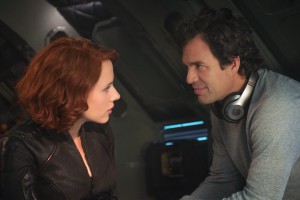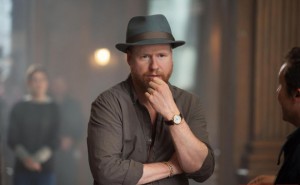Black Widow and Whedon Exceptionalism: Accounting for Sexism in Age of Ultron and the MCU

Post by Piers Britton, University of Redlands
As I started planning this post, a few days before the general release of the second Avengers movie, issues of authorship and creative control—and attendant problems of narrative cogency in the Marvel Cinematic Universe—already seemed to offer a fruitful basis for comment and reflection. Not for the first time in his career, Ultron’s writer-director Joss Whedon was telling stories of conflict between himself and studio executives. At first remarks were notionally at his own expense: he jokily characterized the development of Marvel’s Agents of S.H.I.E.L.D. as his misunderstanding of the studio’s brief for his three-year contract. Apparently his abrupt withdrawal from day-to-day creative involvement in the ABC series was the result of Marvel’s primarily wanting him to focus on the Avengers sequel. In the wake of Ultron’s release, in a podcast for Empire, Whedon painted a starker picture of creative differences that apparently opened up during production of the movie. He claimed that Marvel executives held to ransom the more surreal and intimately personal passages in Ultron, namely the vignettes of the heroes’ troubled visions brought on by Scarlet Witch (Elizabeth Olsen), and the sequence at a secluded farmhouse, owned by Clint Barton (Jeremy Renner), which allowed for various ruminative two-handers between the principal characters. These are arguably the most “Whedonesque” segments of the blockbuster. According to Whedon, the Marvel team was preoccupied with scenes that tied into, and teased, future MCU movies, viz., those showing the mantic Thor bathing in the Waters of Sight. In short, Whedon offered a narrative of conflict between authorial sensibility and industry logic – Age of Ultron as an internally coherent, emotionally resonant text versus Age of Ultron as an iteration in a cycle – and thus a de facto preview of forthcoming attractions underscoring the fact that the MCU is “all connected.”
Almost at once this narrative of authorial conflict was overshadowed by a more immediately newsworthy one, which again spoke to tensions between individual entries in the MCU super-franchise and the avowed interests of Whedon as a writer and director. On May 4th Whedon terminated his Twitter account, immediately exciting speculation that this was a response to an online “backlash” against Ultron’s portrayal of Natasha Romanoff, the Black Widow (Scarlett Johansson). During the subsequent week a wide array of commentary centered on Whedon’s avowed feminism, and whether or not his treatment of Romanoff in Ultron upholds or (as was more widely opined) undercuts his claims to be a feminist. Objections to Whedon’s treatment of Black Widow focused on a series of plot elements, and one specific line of dialogue. Among other things critics objected to Romanoff’s being romantically paired with Bruce Banner (Mark Ruffalo), to her being cast as the stereotypical caregiver—taming the Hulk with a lullaby, “cleaning up” after the “boys” in the team, etc.—and to her “domestication” in the scenes at Barton’s farm. While at the farm she discusses with Banner the possibility of their settling down, and we learn that she was rendered sterile in a particularly nasty graduation ceremony at her assassins’ academy. According to Todd VanDer Werff’s transcription at Vox, the line runs as follows:
They sterilize you. It’s efficient. One less thing to worry about, the one thing that might matter more than a mission. It makes everything easier — even killing. You still think you’re the only monster on the team?
The line is ambiguous in its import: at best, as VanDer Werff speculates, it is a clumsily constructed attempt to suggest that Romanoff is a monster by virtue of her whole career as a spy and assassin; at worst, as many claim, it atavistically reinscribes notions of a woman’s humanity being defined solely by her capacity to bear children.
 I don’t want to dwell on the various positions in the Black Widow debate per se, but I do want to reflect on the fact that I did not myself experience the film as sexist in its portrayal of Romanoff. Structurally, scenes that showed her domestic side or stressed her emotional vulnerability did not strike me as out of balance with the scenes that showed her as single-minded, rational, intensely courageous and supremely competent in her professional life. Nor did the manifestations of her self-doubt and uncertainty about life choices seem to me egregious in comparison with the corresponding treatment of her fellow (male) Avengers. However, there’s no doubt that my neutral-to-positive reading of her portrayal at large, and the “monster” line in particular, was determined by my willingness to give Whedon the benefit of the doubt – which in turn is based largely on my prior knowledge of his television work. In other words, in spite of my scholarly interest in the MCU as brand, by default I read Age of Ultron primarily as a Whedon text, not a Marvel text. The same seems to be true of his detractors: in spite of the odd attempt to read the furore in the context of Marvel’s endemic gender asymmetries, excoriation of Ultron’s sexism has for the most part been couched in terms that presuppose Whedon’s primary authorship.
I don’t want to dwell on the various positions in the Black Widow debate per se, but I do want to reflect on the fact that I did not myself experience the film as sexist in its portrayal of Romanoff. Structurally, scenes that showed her domestic side or stressed her emotional vulnerability did not strike me as out of balance with the scenes that showed her as single-minded, rational, intensely courageous and supremely competent in her professional life. Nor did the manifestations of her self-doubt and uncertainty about life choices seem to me egregious in comparison with the corresponding treatment of her fellow (male) Avengers. However, there’s no doubt that my neutral-to-positive reading of her portrayal at large, and the “monster” line in particular, was determined by my willingness to give Whedon the benefit of the doubt – which in turn is based largely on my prior knowledge of his television work. In other words, in spite of my scholarly interest in the MCU as brand, by default I read Age of Ultron primarily as a Whedon text, not a Marvel text. The same seems to be true of his detractors: in spite of the odd attempt to read the furore in the context of Marvel’s endemic gender asymmetries, excoriation of Ultron’s sexism has for the most part been couched in terms that presuppose Whedon’s primary authorship.
So has Whedon’s self-identification as a feminist, and his reputation as at least a would-be feminist writer, served perversely to obfuscate larger patterns of authorial bias, drawing attention away from Marvel Studios’ problematic representations and exclusions of women? In the short term this may be the case, but probably not over the long haul. While the billion-dollar success of Ultron will likely do little in production terms to encourage reevaluation of storytelling strategy and values in the MCU, from a reception standpoint this latest cause célèbre seems almost certain to be historicized as part of a pattern. If we compare the sluggish, scattered responses to the undermining and cheapening of female characters in the last Bond movie, Skyfall (Mendes, 2012), the groundswell of frustration at Marvel’s institutionalized sexism—articulated most recently by one of Ultron’s male stars—suggests that Marvel’s new breed of tent-pole movie is likely to be a prime locus of critique on issues of balanced and diverse representation for some time to come.


